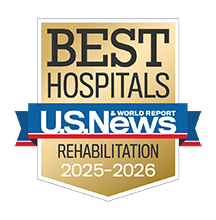Audiologic Rehabilitation

From newborns to seniors, hearing issues can affect anyone at any age. At Atrium Health Carolinas Rehabilitation, our goal is to figure out each patient’s degree and type of hearing loss. Then we make recommendations for any additional evaluation, care or early intervention services (for children) that patients need.
Atrium Health Carolinas Rehabilitation is proud to be named a Best Rehabilitation Hospital, ranking in the top 15 nationally and best in the Southeast by U.S. News & World Report.
Patient Care – What to Expect
We use the latest technology and equipment to get to the root of hearing problems. Patients choose us because we offer:
- Personalized testing: We offer many advanced hearing tests based on your individual needs. We start with a thorough review of your history and talk about the challenges you’re facing. Then we’ll pick the right diagnostic test for you.
- Care for all ages: We have deep experience caring for kids, adults and seniors. Kids are often considered a “difficult-to-test” population, but we have over 50 years of experience using kid-specific tests to make this process easy. We have also helped hundreds of adults and seniors understand their hearing problems, so their doctors and therapists can help address them.
- Supportive services: We connect families to programs like the North Carolina Beginnings Program and the North Carolina Infant-Toddler Program to support kids and families with hearing, speech and communication issues.
- Continued care: After we understand your hearing issue, we can connect you to a variety of specialists to help you manage and overcome it. These specialists include speech therapists, occupational therapists and pediatricians who specialize in learning disabilities.
Audiological Testing: Who We See
We see all types of patients, from babies with hearing loss to adults facing hearing problems after cancer treatments. We get referrals from pediatricians, ear-nose-and-throat specialists, neurologists and geneticists. Our patients include:
- Newborns who failed the newborn hearing screening
- Babies who spent time in the neonatal intensive care unit
- Patients with ringing in their ears (tinnitus)
- Kids with blood disorders (which can lead to hearing problems)
- Patients experiencing hearing loss after chemotherapy
- Patients experiencing a sudden loss of hearing (autoimmune inner ear disease)
- Patients with ringing in their ears, plus feeling like their ears are full of fluid (acoustic neuroma)
- Patients who experienced a head injury
- Patients who feel like the sounds around them are unclear or muffled (presbycusis)
Diagnostic Testing
We perform a variety of state-of-the-art hearing assessments. We use a patient’s age and symptoms to decide which test is right for them. We offer:
- Brainstem auditory evoked response test: Typically for infants and toddlers, this test measures the hearing nerve's response to sound.
- Otoacoustic Emissions Test: This test measures a response from the cochlea, an organ in your ear that helps you hear, to see if problems with the cochlea are causing hearing problems.
- Visual Reinforcement Audiometry: This test is for kids from around 6 months to two years of age, depending on their development. The child sits on their parent’s lap during the test. We teach the child to turn their head and look for a toy when they hear a beeping sound. This helps us understand what type of hearing loss they have, and how severe it is.
- Conditioning Play Audiometry: For children between 2 and 5, we use kid-centric activities – like teaching a child to put a block in a bucket when they hear a sound – to test their hearing. This helps us determine the type and degree of their hearing loss.
- Routine hearing test: Testing hearing by asking participants to raise their hand or press a button when they hear a beep.
- Tympanometry: This test can help us understand if problems in the middle ear, like wax plugging up the ear canal or fluid behind the eardrum, are causing hearing problems.
